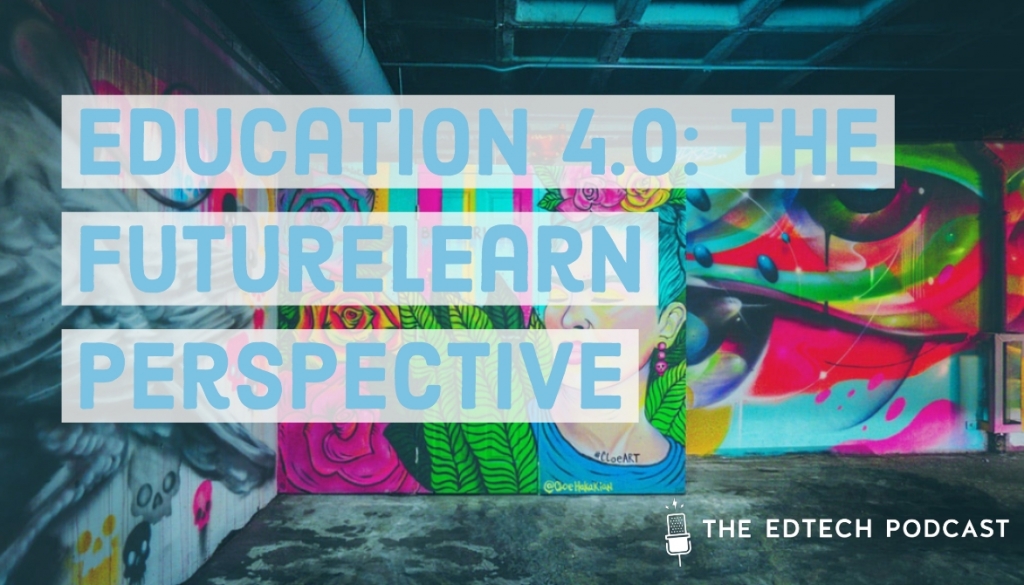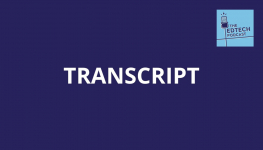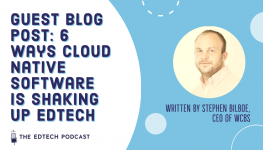Education 4.0: The FutureLearn Perspective

This post is a follow up to episode 142 which featured a live recording from Digifest. Kathryn Skelton was unable to make the panel so has kindly followed up with her points below. Happy reading!
Kathryn Skelton, Chief Strategy Officer, FutureLearn
FutureLearn, Europe’s leading online social learning platform, was founded by The Open University in 2012 and now has over nine million learners. It partners with over a quarter of the world’s top universities, along with organisations such as Accenture and the British Council to create enjoyable, credible online courses and degrees.
Many of the themes at this year’s Digifest resonated with the experience we have at FutureLearn of working in partnership with universities to support their digital transformation.
Here we expand on four key points:
1) The next wave of change in education is about transforming access
As the panel referenced, adult learning should not be the preserve of campus-based 18-25 year-olds and is increasingly open to those learning “on the move” alongside other aspects of their lives. For many ‘FutureLearners’, that’s already the case, with 50% in full or part-time employment. While in some areas of higher education this move to part-time learning is revolutionary, for us, it’s the natural extension of The Open University’s method of supported, open learning. And with The OU celebrating its 50th birthday this year, that idea is hardly new. What is new however is the impact digital technology is having on open distance learning.
Mobile technology is a case in point. Over a third of learners access FutureLearn via mobile devices, demonstrating changing behaviours stemming from the availability of mobile technology.* With increasing numbers of people in the developed world having an internet connected computer in their pocket, designing for mobile really can revolutionise access to learning.
For us, it feels important to remember that mobile technology isn’t the end in itself, rather the means to enhance flexibility and promote access to education to a wider demographic. Similarly, as with many of the other technologies mentioned by the panel, mobile’s key focus is on the intended impact — the flexibility to fit education into differently-shaped lives.
2) We think international collaboration will be a key enabling function for the next wave of education
FutureLearn Senior Learning Technologist, Vicky Brown, noted to the DigiFest panel that Coventry University in the UK and Deakin University in Australia have recently launched a co-created degree in Entrepreneurship through the FutureLearn platform, which gives us our first pioneers in collaboration in the degree space. We see collaboration as a vital component in the future of education because it enables universities to expand the range of courses they offer to their core student base, thereby improving their learning experience and ability to share their expertise with new audiences from different locations around the world.
Critically, collaboration also enables universities to learn from each other along the way — avoiding pitfalls, learning from best practice, and capitalising on successes. This is at the heart of the way FutureLearn works, with its partnership network of 200 institutions worldwide and a series of events and materials to help us and our partners improve and innovate. Events like Digifest and organisations like JISC are key factors in this equation and their work to facilitate collaboration across the UK HE sector should be celebrated.
3) The big challenge is industry relevance
We know that employers are already looking to digital learning as they make hiring and promotion decisions — and as a means of upskilling workforces. There are lots of great examples of this in the education sector. The panel referenced Connect2Teach as one fantastic organisation which is supporting this push by connecting experts with teaching providers, and one audience member called out medical schools as hubs of industry-connected learning. But these examples are notable because they’re relatively rare.
At FutureLearn, we work directly with employers to try to understand their needs and expectations, and reflect these back into the university sector. You can see, for example, the themes from our first employer breakfast here. We are also involved in several government initiatives. The Institute of Coding (IoC), for example, is a £20m project aiming to develop the next generation of digital talent at degree level and above through a collaboration between universities, employers and outreach organisations. Our work with the IoC is a great illustration of the two facets of the response to employer needs: the use of appropriate modes and formats of delivery, and the development of relevant learning material designed to meet employer and learner needs.
4) At the heart of every learning experience is the learner
The Digifest panel touched on automation and AI, and the potential impact on the experience of learning as robots and computers replace some aspects of the education system that currently seem so familiar to us. Of course, at FutureLearn we don’t deny that there’s scope for technology to replace some of the roles currently played by humans, and this is exactly what enables us to scale up the availability of education to reach more people. But as the panellists said, some things will always be uniquely human, including creativity, debate, forming opinions, empathy and the experience of learning itself.
This is one of the reasons we focus our approach on social learning. Rather than broadcasting long classroom lectures, learners are actively involved in the learning experience by watching videos, reading articles and engaging in online discussions. They are encouraged to engage with one another by ‘liking’ and replying to comments as they share knowledge with their peers.
The other key benefit of social learning, compared to classroom-based learning for example, is that it can improve with greater numbers of learners rather than be compromised by them. Facilitated correctly and supported through appropriate use of technology, an experience involving thousands of students and educators can be even more valuable than an experience between just two individuals, bringing together a huge range of views and perspectives. Indeed, it’s perhaps not surprising that we’ve seen some correlation between those we’d describe as ‘social learners’ and greater course completion rates.
*Data representative of Jan-Dec 2018.


